Awards
❖ Wiley Top Cited Article
Wiley Interdisciplinary Reviews Series (WIREs), Data Mining and Knowledge Discovery Journal
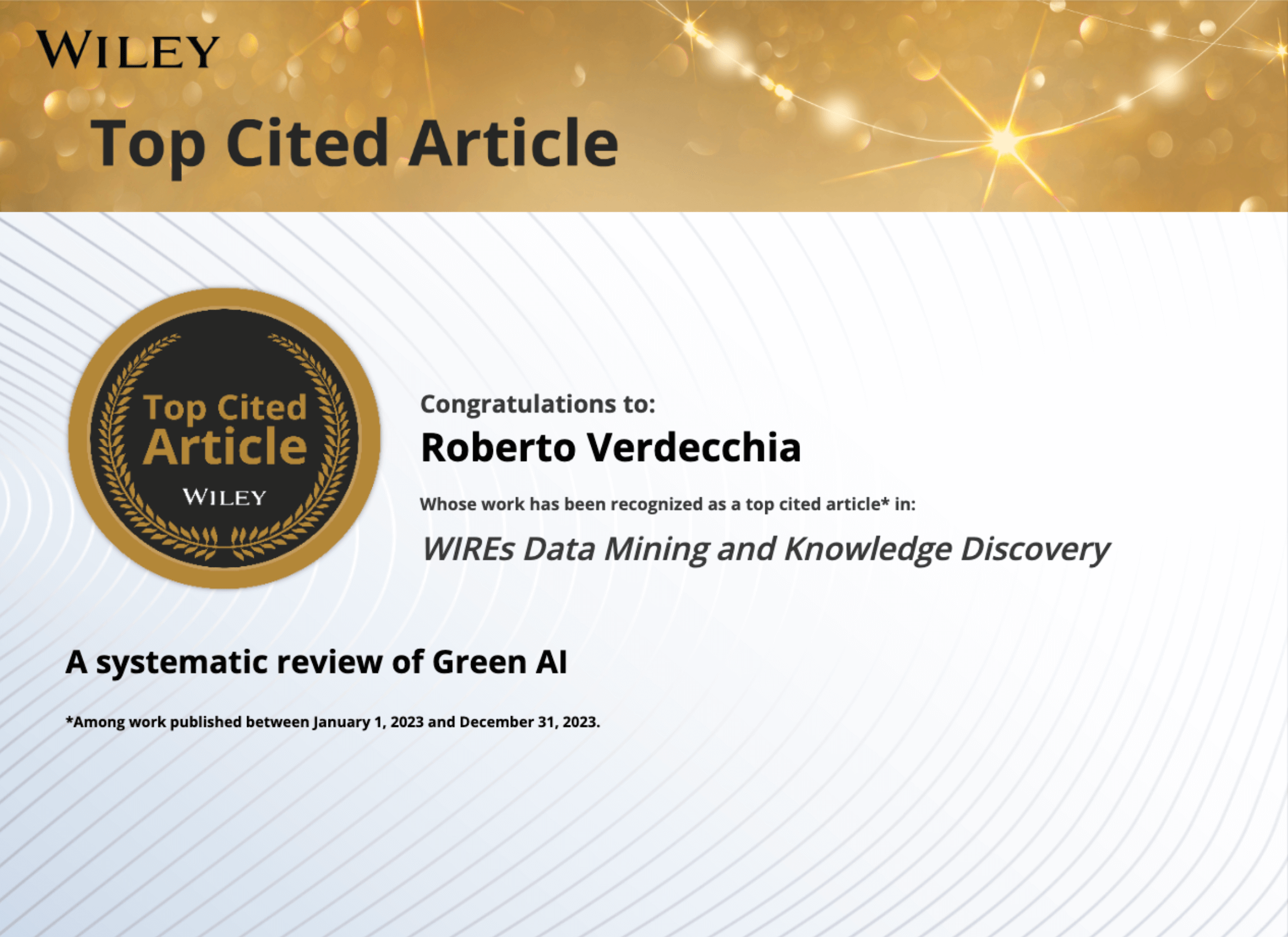
Awarded for the paper: "A Systematic Review of Green AI"
Abstract: With the ever-growing adoption of AI-based systems, the carbon footprint of AI is no longer negligible. AI researchers and practitioners are therefore urged to hold themselves accountable for the carbon emissions of the AI models they design and use. This led in recent years to the appearance of researches tackling AI environmental sustainability, a field referred to as Green AI. Despite the rapid growth of interest in the topic, a comprehensive overview of Green AI research is to date still missing. To address this gap, in this paper, we present a systematic review of the Green AI literature. From the analysis of 98 primary studies, different patterns emerge. The topic experienced a considerable growth from 2020 onward. Most studies consider monitoring AI model footprint, tuning hyperparameters to improve model sustainability, or benchmarking models. A mix of position papers, observational studies, and solution papers are present. Most papers focus on the training phase, are algorithm-agnostic or study neural networks, and use image data. Laboratory experiments are the most common research strategy. Reported Green AI energy savings go up to 115%, with savings over 50% being rather common. Industrial parties are involved in Green AI studies, albeit most target academic readers. Green AI tool provisioning is scarce. As a conclusion, the Green AI research field results to have reached a considerable level of maturity. Therefore, from this review emerges that the time is suitable to adopt other Green AI research strategies, and port the numerous promising academic results to industrial practice.
❖ Best Paper Award
18th European Conference on Software Architecture (ECSA 2024)
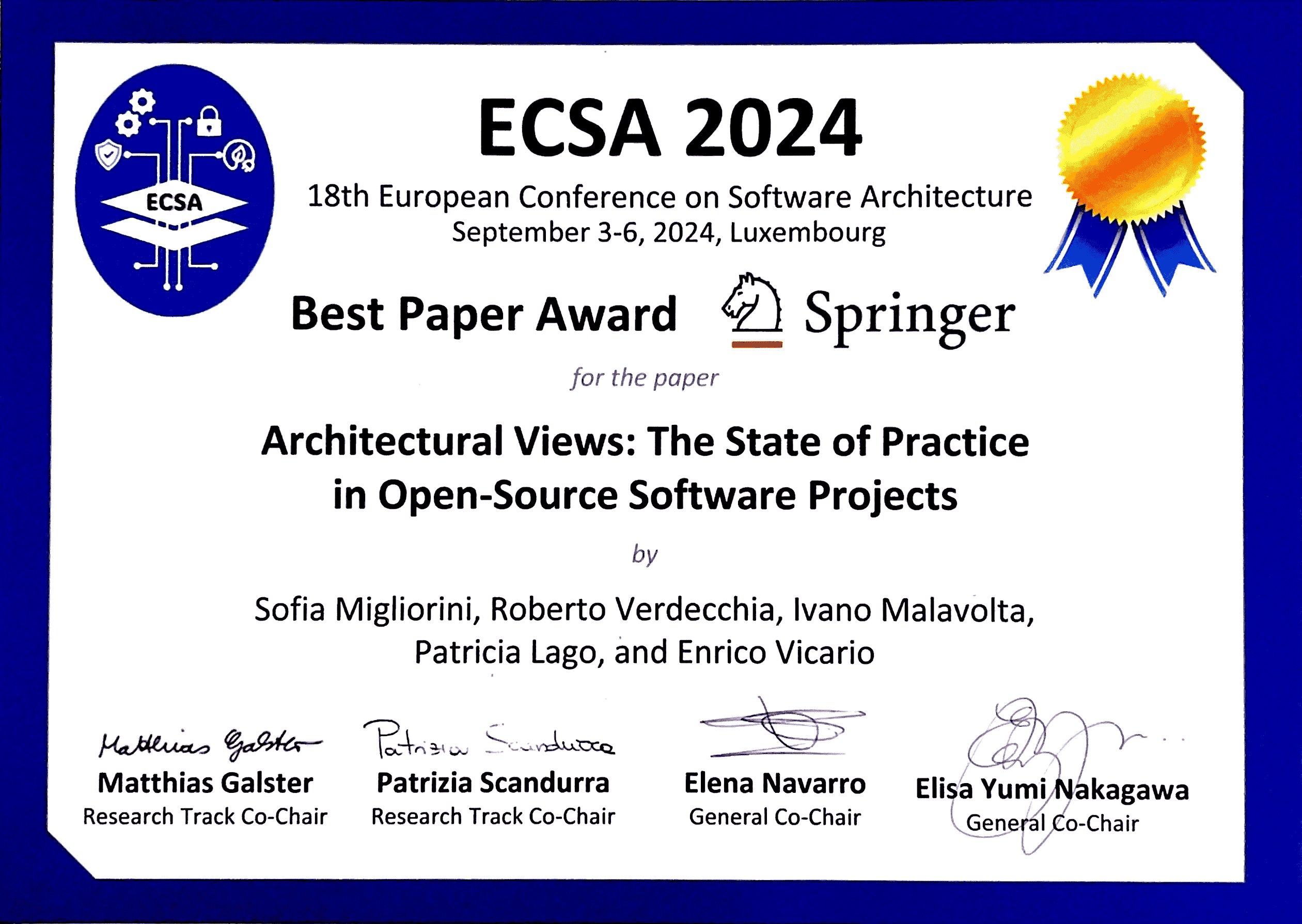
Awarded for the paper: "Architectural Views: The State of Practice in Open-Source Software Projects"
Abstract: Context: Architectural views serve as fundamental artefacts for designing and communicating software architectures. In the context of collaborative software development, producing sound architectural documentation, where architectural views play a central role, is a crucial aspect for effective teamwork. Despite their importance, the use of architectural views in open-source projects to date remains only marginally explored. Goal: We aim at conducting a comprehensive analysis on an extensive corpus of open-source architectural views. The goal is to understand (i) what the “history” of architectural views is, (ii) how architectural views are represented, and (iii) what architectural views are used for in the context of open-source projects. Methods: We leverage a software repository mining process to systematically construct a dataset of 15k architectural views. Then, we perform (i) a quantitative analysis on the metadata of all 15k views and (ii) a qualitative analysis on a statistically-relevant sample of 373 views. Results: Most projects rely on a single architectural view, which is often used to document a medium or high level description of the architecture. Views are usually created at either the beginning or at the end of a project, are rarely updated, and tend to be maintained by a single contributor. Views usually adopt an informal colored notation without a supporting legend and frequently report technologies used. Deployment and control flow are the most recurrent viewpoints, and commonly cover concerns related to software maintainability and functional suitability. Conclusion: The state of the practice about architectural views in open-source software systems seems to favor informal descriptions. Despite this, the effort needed to create views might hinder keeping views up to date, and a common syntactic ground between viewpoints seems hard to find. To address current needs, we speculate that a solution could lie in defining and popularizing versionable, templateable views that can be integrated in collaborative programming environments.
❖ Best Paper Award
Journal of Systems And Software (JSS)
Awarded for the project: "Building and evaluating a theory of architectural technical debt in software-intensive systems"
Abstract: Architectural technical debt in software-intensive systems is a metaphor used to describe the “big” design decisions (e.g., choices regarding structure, frameworks, technologies, languages, etc.) that, while being suitable or even optimal when made, significantly hinder progress in the future. While other types of debt, such as code-level technical debt, can be readily detected by static analyzers, and often be refactored with minimal or only incremental efforts, architectural debt is hard to be identified, of wide-ranging remediation cost, daunting, and often avoided. In this study, we aim at developing a better understanding of how software development organizations conceptualize architectural debt, and how they deal with it. In order to do so, in this investigation we apply a mixed empirical method, constituted by a grounded theory study followed by focus groups. With the grounded theory method we construct a theory on architectural technical debt by eliciting qualitative data from software architects and senior technical staff from a wide range of heterogeneous software development organizations. We applied the focus group method to evaluate the emerging theory and refine it according to the new data collected. The result of the study, i.e., a theory emerging from the gathered data, constitutes an encompassing conceptual model of architectural technical debt, identifying and relating concepts such as its symptoms, causes, consequences, management strategies, and communication problems. From the conducted focus groups, we assessed that the theory adheres to the four evaluation criteria of classic grounded theory, i.e., the theory fits its underlying data, is able to work, has relevance, and is modifiable as new data appears. By grounding the findings in empirical evidence, the theory provides researchers and practitioners with novel knowledge on the crucial factors of architectural technical debt experienced in industrial contexts.
❖ Best Reviewer Award
16th European Conference on Software Architecture (ECSA 2022)
❖ Distinguished Reviewer Award
9th ACM/IEEE International Conference on Mobile Sofware Engineering and System (MoibleSOFT 2022)
❖ Facebook Research Award
Facebook Research 2021
Awarded for the project: "Testing non-testable programs using association rules"
Research grant: 94K$ USD
Abstract: We propose a novel testing approach leveraging efficient Association Rules Mining (ARM) algorithms. ARM-basED (ARMED, for short) testing is especially suitable for the validation of large-scale systems exhibiting non-deterministic behaviourssuch as social networks. Association Rules (ARs) discovered from system history are used to define (both positive and negative) expected behaviours (i.e., test oracles)
❖ Best Presentation Award
4th International Conference on Technical Debt (TechDebt 2021)
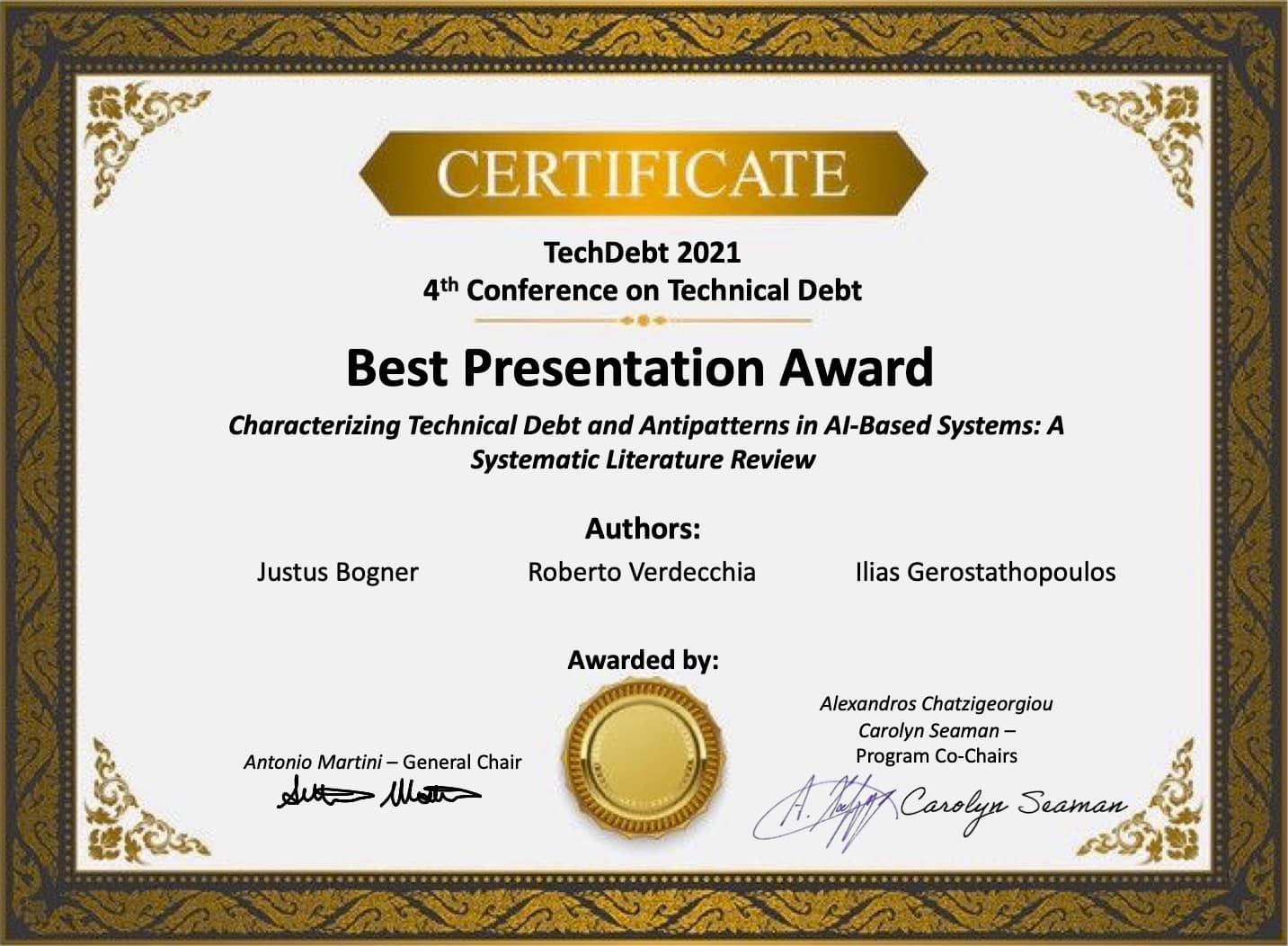
Awarded for the paper: "Characterizing Technical Debt and Antipatterns in AI-Based Systems: A Systematic Mapping Study"
Abstract: Background: With the rising popularity of Artificial Intelligence (AI), there is a growing need to build large and complex AI-based systems in a cost-effective and manageable way. Like with traditional software, Technical Debt (TD) will emerge naturally over time in these systems, therefore leading to challenges and risks if not managed appropriately. The influence of data science and the stochastic nature of AI-based systems may also lead to new types of TD or antipatterns, which are not yet fully understood by researchers and practitioners. Objective: The goal of our study is to provide a clear overview and characterization of the types of TD (both established and new ones) that appear in AI-based systems, as well as the antipatterns and related solutions that have been proposed. Method: Following the process of a systematic mapping study, 21 primary studies are identified and analyzed. Results: Our results show that (i) established TD types, variations of them, and four new TD types (data, model, configuration, and ethics debt) are present in AI-based systems, (ii) 72 antipatterns are discussed in the literature, the majority related to data and model deficiencies, and (iii) 46 solutions have been proposed, either to address specific TD types, antipatterns, or TD in general. Conclusions: Our results can support AI professionals with reasoning about and communicating aspects of TD present in their systems. Additionally, they can serve as a foundation for future research to further our understanding of TD in AI-based systems.
❖ Facebook Testing and Verification Research Award
Facebook Testing and Verification Symposium 2019 (Facebook TAV 2019)
Awarded for the project: "Static Prediction of Test Flakiness"
Research grant: 50K$ USD
Abstract: The goal of this project is to develop an approach that can detect test flakiness early, preventing as far as possible that flaky tests are committed to test repositories. We propose FLAST, a fully automated approach that checks each new test method and provides a flakiness assessment: test labeled as flaky can be immediately returned to their creator for analysis and revision, whereas test cases that do not look suspicious are safely released to test suite repositories. FLAST is based exclusively on the application of well-known and fast static analysis techniques to test code. In fact, FLAST is a lightweight pre-screening technique that can complement other dynamic approaches: these will still be used, but on a much smaller set (i.e., those few test cases that fail intermittently after having passed FLAST filtering). Indeed, the advent of FLAST will transform the current ATAFistic world into a more lively AFTAFistic world (Assume Few Tests Are Flaky). Given the high impact of flaky tests both on software development costs and on developers’ motivation, predicting them timely and with high precision will bring great gains with exceptionally low additional costs.
❖ ACM SIGSOFT Distinguished Paper Award
41st IEEE/ACM International Conference on Software Engineering (ICSE 2019)
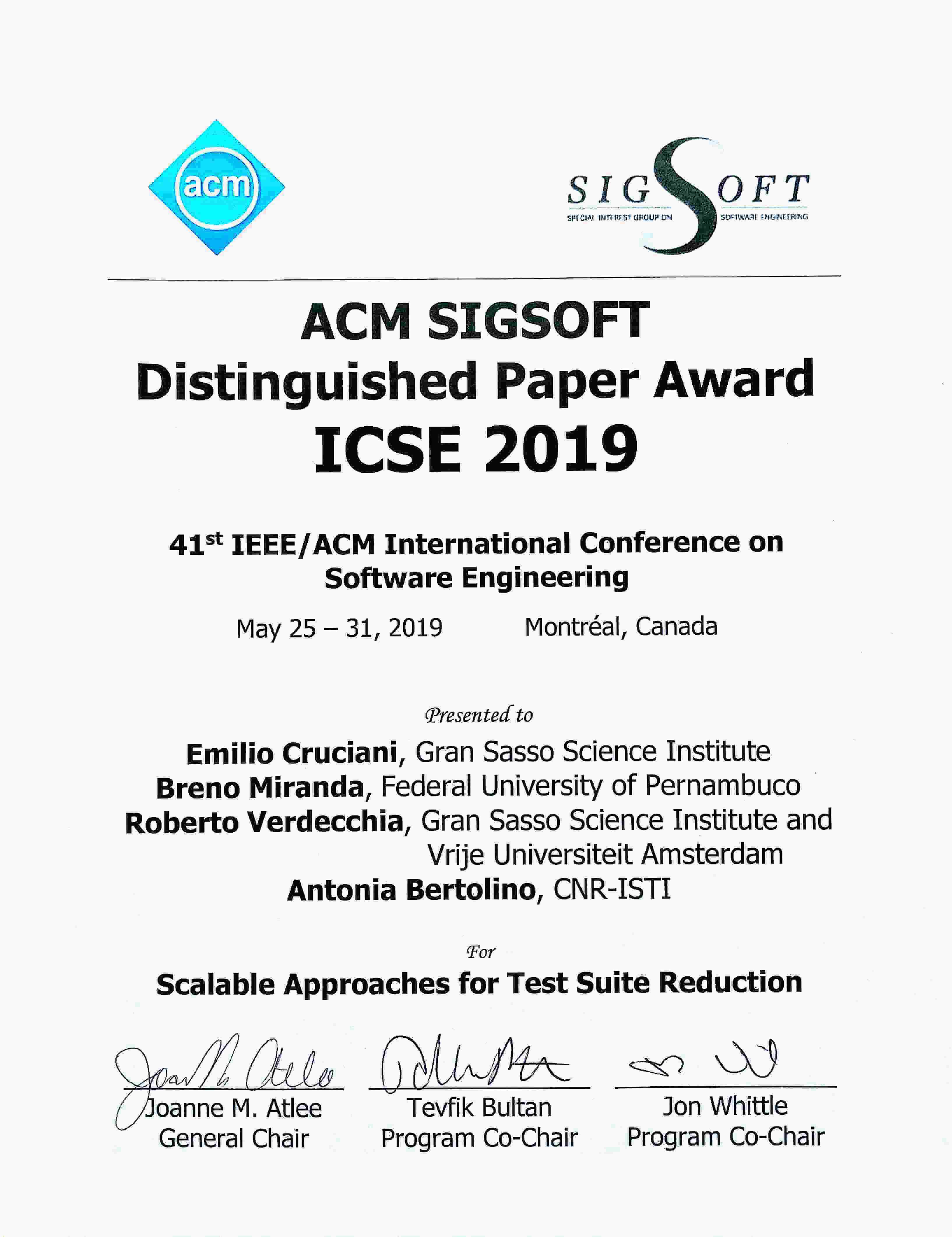
Awarded for the paper: "Scalable Approaches for Test Suite Reduction"
Abstract: Test suite reduction approaches aim at decreasing software regression testing costs by selecting a representative subset from large-size test suites. Most existing techniques are too expensive for handling modern massive systems and moreover depend on artifacts, such as code coverage metrics or specification models, that are not commonly available at large scale. We present a family of novel very efficient approaches for similaritybased test suite reduction that apply algorithms borrowed from the big data domain together with smart heuristics for finding an evenly spread subset of test cases. The approaches are very general since they only use as input the test cases themselves (test source code or command line input). We evaluate four approaches in a version that selects a fixed budget B of test cases, and also in an adequate version that does the reduction guaranteeing some fixed coverage. The results show that the approaches yield a fault detection loss comparable to state-of-the-art techniques, while providing huge gains in terms of efficiency. When applied to a suite of more than 500K real world test cases, the most efficient of the four approaches could select B test cases (for varying B values) in less than 10 seconds.
❖ Best Early Career Researcher Award
15th IEEE International Conference on Software Architecture (ICSA 2018)
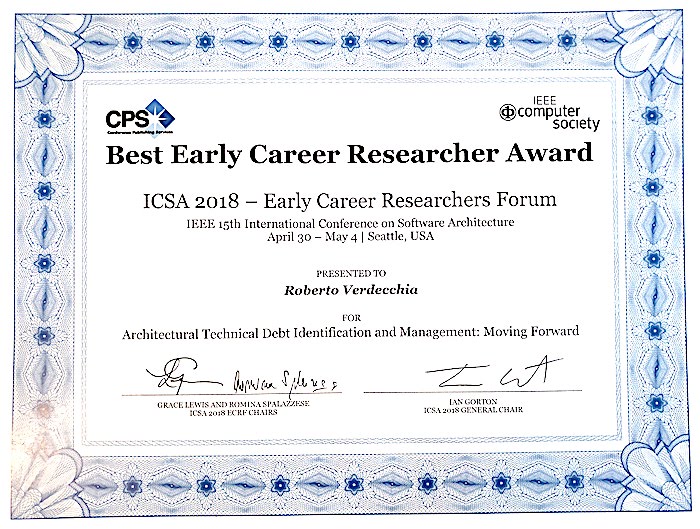
Research statement: In software-intensive systems, technical debt is a metaphor encompassing design and implementation constructs that are used as expedients in the short term, but that hinder future maintainability and evolvability. Architectural technical debt, in turn, adopts such concept by considering sub-optimal architectural design and implementation choices that bring short-term benefits to the cost of the long-term gradual deterioration of the quality of the software architecture. Architectural technical debt is an active field of research. Nevertheless, how to accurately identify and manage architectural technical debt is still an open question. Our research aims to fill this gap. In particular, our goal is to: (i) consolidate the existing knowledge of architectural technical debt identification and its management in practice, (ii) conceive novel identification and management approaches built upon the existing state of the art techniques and industrial needs, and (iii) provide empirical evidence of architectural technical debt phenomena and assess the viability of the conceived approaches. As a result, we envision a sound methodology aimed to support software architects in the identification and management of architectural technical debt throughout the software development process
❖ Best Paper Award
52th Hawaii International Conference on System Sciences (HICSS 2019)
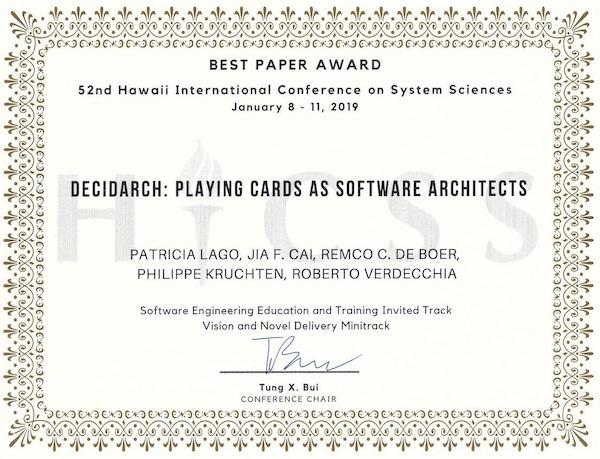
Awarded for the paper: "DecidArch: Playing Cards as Software Architects"
Abstract: Teaching software architecture is a challenge because of the difficulty to expose students to actual meaningful design situations. Games can provide a useful illustration of the design decision making process, and teach students the power of team interaction for making sound decisions.We introduce a game –DecidArch– developed to achieve three learning objectives: (i) create awareness about the rationale involved in design decision making, (ii) enable appreciation of the reasoning behind candidate design decisions proposed by others, and (iii) create awareness about interdependencies between design decisions. The game has been played by 22 groups with a total of 83 players, all of them students of the VU software architecture course. We present some of the lessons learned, both from our observation and through participant survey. We conclude that the game well supports our three learning objectives, and we identify several improvement points for future game editions.
❖ Runner-up Best Paper Award
5th International Conference on ICT for Sustainability (ICT4S 2018)
Awarded for the paper: "Empirical Evaluation of the Energy Impact of Refactoring Code Smells"
Abstract: Software energy efficiency has gained the increasing attention of the research community. How to improve it, however, still lacks evidence. Specifically, the impact of code smell refactoring on energy efficiency has been scarcely investigated. In the exploratory study here reported, we investigate the impact on performance and energy consumption of refactoring well-known code smells on Java software applications. In order to understand if software metrics can be used as indicators of the energy impact of refactoring, we also measured the variation caused by refactoring on a set of well-established software metrics. We conducted a controlled experiment using state-of-the-art power measurement equipment. Statistical hypothesis testing and effect size estimation were performed on the experimental results, which show that in one out of three applications, refactoring each smell significantly impacted power- and energy consumption. E.g., refactoring Feature Envy and Long Method smells led to a 49% energy efficiency improvement. No software metric, however, significantly correlated with execution time, power or energy consumption. In conclusion, refactoring code smells resulted to be a viable process to significantly improve software energy efficiency. The magnitude of the impact may depend on application properties, e.g. size or age. Further research is needed to understand the relationship between software metrics and energy efficiency.
❖ ISSIP-IBM-CBA Student Paper Award for Best Industry Studies Paper
52th Hawaii International Conference on System Sciences (HICSS 2019)
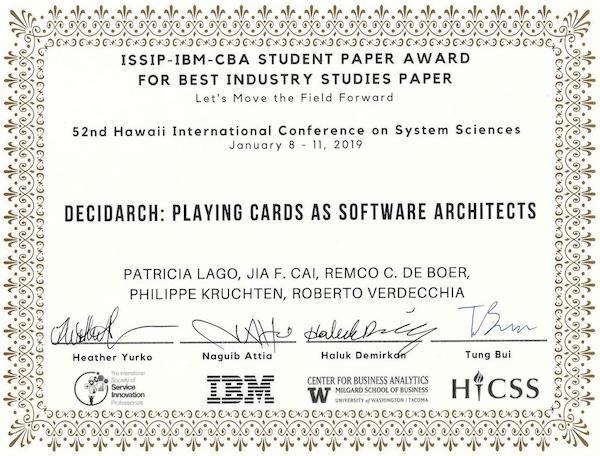
Awarded for the paper: "DecidArch: Playing Cards as Software Architects"
Abstract: Teaching software architecture is a challenge because of the difficulty to expose students to actual meaningful design situations. Games can provide a useful illustration of the design decision making process, and teach students the power of team interaction for making sound decisions.We introduce a game –DecidArch– developed to achieve three learning objectives: (i) create awareness about the rationale involved in design decision making, (ii) enable appreciation of the reasoning behind candidate design decisions proposed by others, and (iii) create awareness about interdependencies between design decisions. The game has been played by 22 groups with a total of 83 players, all of them students of the VU software architecture course. We present some of the lessons learned, both from our observation and through participant survey. We conclude that the game well supports our three learning objectives, and we identify several improvement points for future game editions.
❖ Bronze Medal - ACM Student Research Competition
5th International Conference on Mobile Software Engineering and System (MobileSoft 2018)
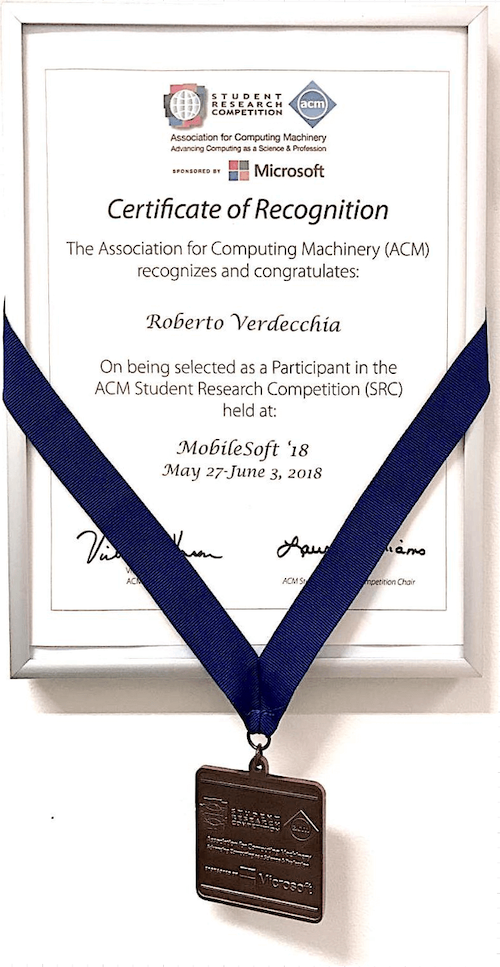
Awarded for the paper: "Identifying Architectural Technical Debt in Android Applications through Compliance Checking"
Abstract: By considering the fast pace at which mobile applications need to evolve, Architectural Technical Debt results to be a crucial yet implicit factor of success. In this research we present an approach to automatically identify Architectural Technical Debt in Android applications. The approach takes advantage of architectural guide- lines extraction and modeling, architecture reverse engineering, and compliance checking. As future work, we plan to automate the process and empirically evaluate it via large-scale experiments.

